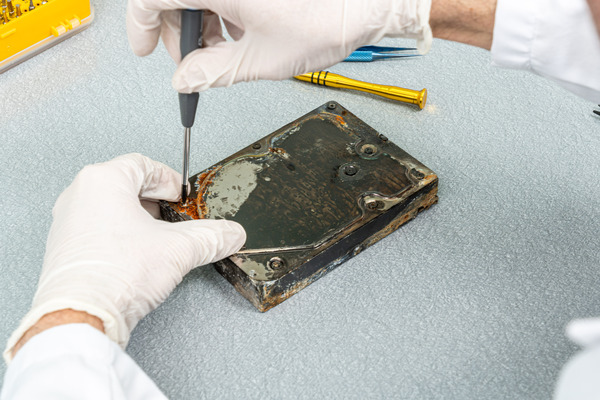5 tips for recovering data from your hard drive after a fire
Fire is potentially the most serious damage to a hard disk or server. In addition to the damage caused by exposure to extreme temperatures, fire extinguishing usually involves the use of water, foam or other media, which pollutes the hard disk both inside and out.
Dealing with hard disks recovered from fires requires considerable expertise and know-how. In the aftermath of such a disaster, a hard disk will usually only withstand one attempt at data recovery, so it’s important to be demanding in your choice of service provider. Databack has the necessary equipment, procedures and skills acquired over the last 15 years.
HARD DISKS FACE HEAT
Under normal operating conditions, the temperature of a hard disk is between 30 and 50°c. A short exposure to a temperature of 100°c may not cause any major damage, but prolonged exposure to a temperature of 200°c may result in data corruption. Above 300°c, the components of the hard disk are damaged: soldering of the electronic board, melting of internal plastic parts, deformation of platters, etc…
Fire damage
Depending on the exposure of your substrate to fire, the damage can be manifold:
- Damaged electronic board: solder joints and components damaged by heat.
- soot deposit
- melted inner and outer plastic elements
- plate surface alteration (heat-damaged magnetic substrate layers)
- heat deformation of trays

OUR TIPS FOR RECOVERING YOUR DATA AFTER A FIRE
To optimize the chances of recovering your data, it is advisable to follow a few precautions:
- DO NOT reconnect a hard disk that has suffered a fire, as this may cause further damage to the platters, or even irreparable damage.
- DO NOT clean a burned hard disk yourself: cleaning the media with water or unsuitable products could compromise data recovery. Our experts have the experience and equipment required for this delicate phase, on which the success of your data recovery depends.
- DO NOT open your hard disk to avoid contamination of the platters.
- Act IMMEDIATELY by sending your hard drive to a data recovery specialist the same day or the next. After that, your chances of recovery diminish day by day.
- CONTACT YOUR INSURER to find out if data recovery is covered.









